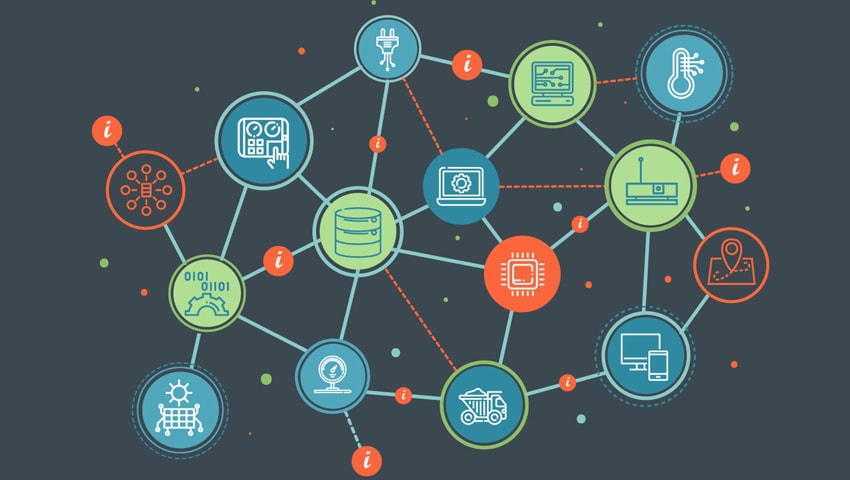Most organizations have already implemented technologies — such as instrumentation, SCADA, and asset management or computerized maintenance management systems — to provide near-real-time visibility of their processes and operations. So what value will IoT add to your existing technology investments?
The short answer is a lot, though the specifics depend on your industry. In general, IoT’s benefits can be lumped into six categories:
- Democratizes analytics
- Creates new business opportunities
- Makes work safer, more productive, and more rewarding
- Enables instantaneous process monitoring and control
- Informs better decisions
- Optimizes process & resource utilization
This blog describes the first three benefits; Part 2 tackles the last three benefits on the list. Finally, Part 3 will address industry-specific benefits and case studies.
1. DEMOCRATIZATION OF ANALYTICS
On a recent demo, a prospective client quipped, “We can implement analytics ourselves, but we just don’t have the time and money to do so.”
In the past, organizations had to build their own analytics — spending their own time and money to develop and test their own algorithms. However, IoT’s interconnectivity standards means there’s a new market of pre-built analytics engines, such as Motors@Work, that provide low-cost plug-and-play access to the analytics needed to monitor specific types of markets, facilities, and asset classes. By democratizing analytics — making it accessible to everybody, not just the big spenders who could afford to build their own — IoT disrupts the traditional consulting and customized software market.
2. NEW BUSINESS OPPORTUNITIES
According to Forrester, only 27% of business-to-business firms have a coherent strategy for adding value through digital transformation; yet, a Gartner survey shows that CEOs expect revenue from digital services to grow more than 80% by 2020.[1]
IDC explains this discrepancy by predicting the emergence of the “digital transformation (DX) economy.”[2] Like the dot-com revolution of the late 1990s and early 2000s, the digital transformation economy will create entirely new opportunities that never previously existed. Gartner describes these emerging fields as “algorithmic” and “programmable” products and services,[3] such as the aforementioned democratic analytics engines, cloud computing, artificial intelligence, and smart utility grids.
Traditional industries will also benefit from using IoT to collect customer feedback and usage data to develop new, forward-looking innovations that discover and deliver new value to your customers.[4] For example, McKinsey suggests considering Tesla, which collects terabytes of data from its vehicles, as “IoT on wheels.”[5] Tesla uses this information to continuously improve drivers’ experience of their vehicles and to inform future development cycles — from improvements in maintenance, self-driving capabilities, to totally new features.[6] In other words, each mile driven in one of Tesla’s cars helps it identify its next must-have product or service.
3. SAFER, MORE PRODUCTIVE, & MORE REWARDING WORK
IoT will change the ways and places we work. First, IoT will create new jobs, tasks, and skills for us to master. Digital literacy and data analytics will take increasing importance. As GE chairman Jeff Immelt put it: “If you went to bed last night as an industrial company, you’re going to wake up this morning as a software and analytics company.”[7]
Second, IoT will improve the safety of our workplaces. IoT-connected sensors will help us monitor confined and hazardous places and processes, removing humans from danger. Then, by correlating sensor and environmental data over time, we’ll identify new insights that help us better understand past events and mitigate future risks.
Third, IoT will create new ways for us to work together as a team. Many of us already live in a world where we get work-related notifications on our phone, make a quick decision on how best to respond, and press a button to delegate the action to the best party. While some view our ever-connected personal devices as the padlock to a 24-hour-workplace panopticon, many consider the autonomy and flexibility it grants rewarding: a way to make your job fit into your life, instead of fitting your life around your job. That’s why 58% of respondents in a Harvard Business Review survey rated the improved collaboration and flexibility a benefit — not a burden.[8]
Finally, IoT will make us more productive. Just as robotics eliminated repetitive physical tasks, IoT’s “cognitive outsourcing”[9] will enable us to give computers menial or repetitive mental tasks, enabling us to spend more time on finding operational insights rather than collecting, transforming, and processing the data. IoT also helps us bridge the generational divide — providing a way to transfer the experience and institutional knowledge of retiring Baby Boomers into sleek and engaging work for Millennials. Some analysts also expect working together in new ways with new data will help us to cut down on unproductive meeting time and focus more on identifying new ways to help functional areas deliver their best possible work.
How will IoT benefit your organization? For practical ways to use IoT to make smarter asset management decisions, email us at info@motorsatwork.com
[1] G. Press, “Six predictions about the future of digital transformation,” Forbes, 6 December 2015.
[2] G. Press, “Six predictions about the future of digital transformation,” Forbes, 6 December 2015.
[3] The Economist, “The Internet of Things Business Index 2017: Transformation in motion,” February 2017.
[4] K. Turnali, “Digital transformation is not a technology makeover. It’s a business revolution,” SAP Blog, 10 June 2017.
[5] T.M. Siebel, “Why digital transformation is now on the CEO’s shoulders,” McKinsey Quarterly (December 2017).
[6] K. Korosec, “Why Morgan Stanley is so bullish on Tesla and the Model 3,” Fortune, March 2017. As cited in T.M. Siebel, “Why digital transformation is now on the CEO’s shoulders,” McKinsey Quarterly (December 2017).
[7] A. Scott, “Eight ways the Internet of Things will change the way we live and work,” The Globe & Mail (accessed March 2018).
[8] Harvard Business Review, “Internet of Things: Science fiction or business fact,” 2014.
[9] D. Lumb, “How the Internet of Things is changing work,” Fast Company, 3 November 2015.


